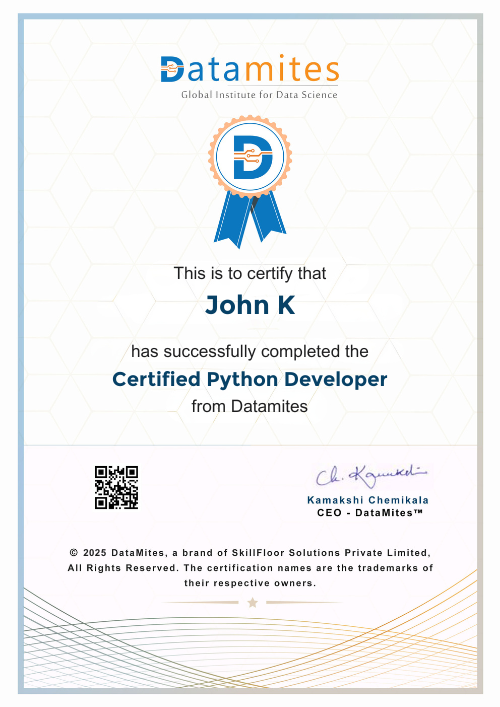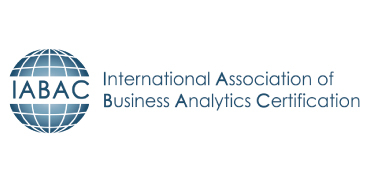Instructor Led Live Online
Self Learning + Live Mentoring
Customize Your Training

• Introduction of python
• Installation of Python and IDE
• Python Variables
• Python basic data types
• Number & Booleans, strings
• Arithmetic Operators
• Comparison Operators
• Assignment Operators
• IF Conditional statement
• IF-ELSE
• NESTED IF
• Python Loops basics
• WHILE Statement
• FOR statements
• BREAK and CONTINUE statements
• Basic data structure in python
• Basics of List
• List: Object, methods
• Tuple: Object, methods
• Sets: Object, methods
• Dictionary: Object, methods
• Functions basics
• Function Parameter passing
• Lambda functions
• Map, reduce, filter functions
• Decorators
• Generators
• Context Managers
• Metaclasses
• Inheritance and Polymorphism
• Encapsulation and Abstraction
• Class methods and static methods
• Special (magic/dunder) methods
• Property decorators - getters, setters, and deletes
• Working with files
• Reading and writing files
• Buffered read and write
• Other file methods
• Logging & Debugger
• Modules and import statements
• SQL Basics
• Creating DB Table
• INSERT, READ, UPDATE, DELETE
• Introduction to MongoDB
• CRUD operations in MongoDB
• namedtuple(), deque, ChainMap,
• Counter, OrderedDict, defaultdict,
• UserDict, UserList, UserString
• Exceptions handling with try-except
• Custom exception handling
• List of general use exception
• Best practice exception handling
• Generators, Iterators
• The Functions any and all
• With Statement
• Data Compression
• A Daytime Server
• Clients and Servers
• The Client and Server Programs
• Classes and Threads
• Multi-threading; thread life cycle
• Regular Expression Syntax
• Group, Split and wildcards
• Quantifiers
• Match, Search and Find all methods
• Character Sequence
• Introduction to OpenCV, Installation
• Basic Operations on Images
• Image Filtering
• Image Classification
• Introduction to GIT
• Basic Git commands
• Introduction to Flask and Installation
• Creating project
• Routing,templates, forms and database integration
• Deployment on render
• Django Introduction and Installation
• Creating a Project
• Django Architecture and File Structure
• Folder Structure, First Django project
• Database and Views, Static Files and Forms
• URL Mapping and Routing
• Defining Models and Relationships
• Database Migrations and Schema Changes
• Querying Data using Django ORM
• Model Forms and Form Validation
• HTML Forms in Django
• Model Forms and Form Validation
• Formsets and Inline Formsets
• File Uploads and Validation
• Deploying Django Applications
• Hosting Options (e.g., Heroku, AWS)
• Project Showcasing and Review
Defining Artificial Intelligence (AI) involves replicating human cognitive functions within mechanized systems, primarily within computer frameworks.
Machine Learning operates as a subset of AI, teaching machines to identify patterns within data and enabling autonomous predictions or decisions without explicit programming.
The practical implications of AI in commerce are vast, including task automation, chatbot deployment for customer service, predictive data analysis, and customized marketing strategies, all aimed at enhancing operational efficiency and decision-making.
AI encompasses a broader framework aimed at emulating human intelligence, while Machine Learning is a specific methodology within AI focused on algorithmic learning from data.
Prominent languages in AI development include Python, R, Java, and C++. Python stands out for its user-friendly interface and extensive libraries conducive to AI progress.
While AI may streamline tasks, its primary goal is to enhance human capabilities rather than completely replace them, leading to shifts in occupational roles and necessary skill sets.
Ethical dilemmas accompanying AI progress include issues like algorithmic bias, privacy breaches, and potential societal impacts such as job displacement and exacerbation of inequalities.
AI risks include misuse of technologies like deepfake, cybersecurity vulnerabilities, and unintended consequences from biased or poorly designed algorithms.
AI engineers are tasked with developing AI models, ensuring data integrity, refining algorithms, and collaborating with interdisciplinary teams.
Top-earning positions in AI include machine learning engineer, data scientist, AI researcher, and AI architect, with salary discrepancies based on experience and location.
Companies seeking AI talent include industry giants like Google, Microsoft, and Amazon, as well as startups, research institutions, and firms across various sectors integrating AI.
In Madrid, expertise in AI can be acquired through online courses, university programs, or specialized training offered by tech organizations and educational institutions.
AI positions in Madrid typically require a degree in computer science, mathematics, or related fields, along with programming skills and practical experience in AI projects.
In-demand skills for AI careers in Madrid include proficiency in Python, an understanding of machine learning algorithms, data analysis skills, and strong problem-solving abilities.
While certifications can enhance credibility, hands-on experience and demonstrable projects carry more weight in securing AI positions in Madrid.
To become an AI engineer in Madrid, focus on acquiring relevant skills through education, hands-on projects, and active involvement in the AI community.
The job market for AI professionals in Madrid is growing, with increasing demand across sectors such as finance, healthcare, and technology startups.
Transitioning to AI from a different career path is feasible through dedicated skill acquisition and building a strong portfolio showcasing AI expertise.
Entry-level opportunities in AI for beginners may include roles such as AI research assistant, data analyst, or junior machine learning engineer, emphasizing learning and skill development.
In healthcare, AI is applied in various areas including medical imaging analysis, drug discovery, personalized treatment plans, and streamlining administrative tasks, all aimed at improving diagnostic accuracy and patient outcomes.
The Economic Research Institute report indicates that the salary range for artificial intelligence engineers in Madrid is EUR 68,267.
DataMites in Madrid provides a range of AI certifications covering Artificial Intelligence Engineering, AI Expertise, Certified NLP Expertise, AI Management, and AI Foundations. These certifications offer comprehensive training in various AI technologies and their practical applications.
DataMites' AI training program in Madrid is open to individuals with backgrounds in computer science, engineering, mathematics, or statistics. It also welcomes participants from non-technical fields, promoting inclusivity and diverse participation.
The duration of DataMites' AI courses in Madrid varies from one to nine months, depending on the chosen program. Flexible scheduling options, including weekdays and weekends, cater to participants' diverse schedules.
To attain proficiency in AI within Madrid, individuals can enroll in DataMites, a reputable institute specializing in data science and AI. DataMites offers customized learning paths designed to empower individuals aspiring to excel in AI.
DataMites' AI Expert training in Madrid stands out for providing participants with a strong foundation in AI fundamentals, machine learning, and practical applications. Led by industry experts, the curriculum emphasizes hands-on learning to prepare individuals for real-world AI challenges.
DataMites in Madrid offers various payment methods for AI course training, including cash, debit/credit cards, checks, EMI, PayPal, and net banking, ensuring convenience for participants.
Yes, DataMites in Madrid integrates live projects, including 10 Capstone projects and 1 Client Project, to provide participants with hands-on experience and practical learning opportunities.
Participants in Madrid can access supplementary help sessions aimed at enhancing their understanding of AI topics, providing additional support and clarification as needed.
DataMites in Madrid adopts a case study-centric approach to AI training, delivering a carefully crafted curriculum tailored to meet industry demands and provide career-oriented education.
Enrolling in DataMites' online AI training in Madrid offers expert-led instruction, flexible learning options, and hands-on experience. Participants can gain industry-recognized certification while mastering machine learning and deep learning concepts, supported by career guidance and a vibrant learning community.
DataMites' AI Training fees in Madrid range from EUR 640 to EUR 1,704, depending on factors such as course selection and duration.
AI training sessions at DataMites in Madrid are led by Ashok Veda, a respected Data Science coach and AI Expert, supported by mentors with real-world experience from prestigious institutions and companies.
Flexi-Pass offers flexible learning options for AI training in Madrid, allowing participants to tailor their schedules and access resources and mentorship to suit their learning pace and commitments.
Upon successful completion of AI training in Madrid, participants receive IABAC Certification, globally recognized within the EU framework, validating their AI skills and knowledge.
Participants attending AI training sessions in Madrid must present a valid photo ID, such as a national ID card or driver's license, to obtain participation certificates and schedule certification exams.
DataMites in Madrid ensures continuous progress for participants despite occasional absences by providing access to recorded sessions or mentor guidance for catch-up.
Yes, participants in Madrid can attend trial classes for AI courses before committing to assess the program's suitability firsthand.
Yes, DataMites in Madrid offers AI Courses bundled with internships in select industries, providing practical experience to enhance participants' career prospects in AI roles.
DataMites' Placement Assistance Team conducts career mentoring sessions in Madrid, offering insights into various career paths in Data Science and AI, along with strategies for navigating challenges.
The AI Foundation Course covers fundamental AI concepts, applications, and real-world examples, catering to individuals with varied technical backgrounds interested in machine learning, deep learning, and neural networks.
The DataMites Placement Assistance Team(PAT) facilitates the aspirants in taking all the necessary steps in starting their career in Data Science. Some of the services provided by PAT are: -
The DataMites Placement Assistance Team(PAT) conducts sessions on career mentoring for the aspirants with a view of helping them realize the purpose they have to serve when they step into the corporate world. The students are guided by industry experts about the various possibilities in the Data Science career, this will help the aspirants to draw a clear picture of the career options available. Also, they will be made knowledgeable about the various obstacles they are likely to face as a fresher in the field, and how they can tackle.
No, PAT does not promise a job, but it helps the aspirants to build the required potential needed in landing a career. The aspirants can capitalize on the acquired skills, in the long run, to a successful career in Data Science.



